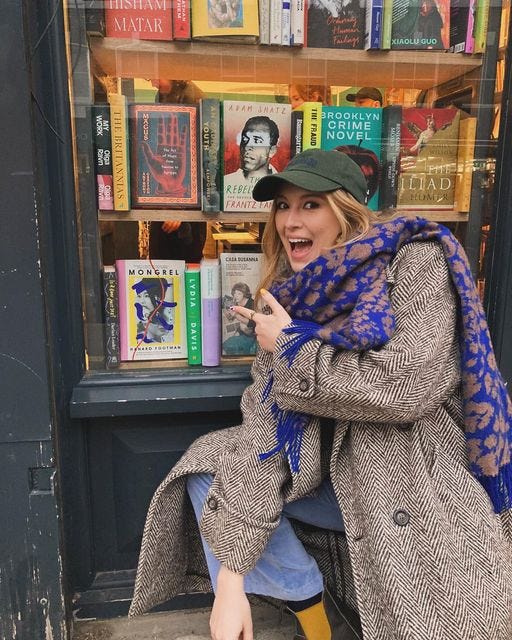Hanako Footman: “When I go to Japan, I feel held”
The actor and author on looking after her childhood self, feeling whole and making her own cultural connections
Hi, welcome back to Mixed Messages! This week I’m speaking to actor and author Hanako Footman, who is of Japanese, white British and Irish heritage. Hanako’s debut novel, Mongrel, follows the stories of Mei, Yuki and Haruka, three young women across Japan and England whose intertwining narratives reveal “a tangled web of desire, isolation, belonging and ultimately, hope.” It’s a lyrical read that will stay with you long after the final page. Read Hanako’s own story below.
How do you define your background? I read in an interview that you were moving away from saying ‘half.’
I have a Japanese mother and an Irish English father. I’m moving away from being too delicate about how I want to describe myself and how I want other people to describe me because it’s a fluid thing that changes day to day.
I’m at peace with the ‘half,’ it doesn’t feel as weighted. Jassa Ahluwahlia’s Both Not Half campaign really summarises how I feel about it. I kind of go with anything. I still sometimes struggle to say that I’m Japanese, because that feels very whole, and in Japan, I'm never seen as a Japanese person.
I've interviewed quite a few mixed Japanese people who have said that in order to be seen as Japanese, you have to be fully Japanese, look fully Japanese and speak perfect Japanese.
Exactly, I’m screwed. I was born with an identity crisis. I also grew up in Wimbledon Village, a very white affluent area. Because of that demographic, I always felt like I wasn't enough. There was a constant desire to fit in. I think that was initially very subconscious, but in retrospect, it’s glaringly obvious to me. One of Mongrel’s protagonists is in love with her best friend, partly because she’s everything that she isn’t, which is white and blonde with blue eyes.
Writing Mongrel has been a huge way for me to make peace with being half-Japanese and half-British, collecting all the parts of myself and putting them back together. A lot of the book is about my lived experience.
I’m the youngest of three sisters so I was lucky in that I had a blueprint to follow into adulthood, but it was definitely a struggle. Simple things like taking your lunchbox to school and people grimacing at your fried rice, those microaggressions really build. At school, I tried not to be associated with the East Asian kids in order to survive.
I think you realise at a certain point in your adult life that you've been shape shifting in order to be loved, or cutting parts of yourself off in order to be accepted. Only in the past couple of years am I growing back into my Japanese self. She’s been neglected for a very long time.
Did you grow up with a lot of Japanese culture at home?
My mum is the beating heart of our family. The food we ate was mostly Japanese, we’d celebrate things like Girls Day and go to Japan every year, but she didn’t teach us Japanese. That’s always been a point of contention and pain. I think speaking fluent Japanese would make my ability to say that I am Japanese and my connection to Japan so much stronger. It’s so vulnerable because you feel like the language should already be yours.
I have felt that fear that when I lose my mother, I’ll no longer be Japanese because she’s my only connection to the country and that side of myself. I’m making a concerted effort to make those connections for myself and not rely on my mum to get me there, especially with food. A lot of that is just accepting that I am Japanese, and that I will continue to be so even after my mom dies.
When you’re not raised in the culture, you have to fight to be in those places, be it a Japanese cafe, going to the cinema to watch films or cooking the food of your ancestors. If you’re not in your motherland or fatherland, it’s not easy, so you have to try and honour and celebrate that side of yourself.
Food is always a key way people connect to their heritage – how else did you connect to Japan?
We’d go to Japan every year to see my grandmother. She’s passed now, but we still have her house. There’s something about Japan that feels like home in a way that the UK doesn’t. My Japanese side is so wrapped up in my childhood and my mother’s love. There was a certain comfort that I don't think I'll ever be able to or want to escape. The UK is where I physically grew up, but the things that nurtured me as a child were so Japanese. When I go to Japan, I feel held.
I did a play at the Royal Court Theatre last year and all the writers were Japanese, with most of the cast being East or Southeast Asian. That was revolutionary because I was going into a space where I was being accepted as an East Asian artist, which I’ve really come up against as an actor. To finally be accepted felt like coming home and like a little revolution inside of me.
Has feeling comfortable been rare throughout your career as an actor?
It’s been pretty awful to be honest. You don’t know for sure if it’s the reason they don’t cast you, but I’ve had casting directors say that I don’t look Japanese enough. My first agent said that I was too difficult to place because of my ethnicity, and that casting my parents was a nightmare. People told me to change my headshots in order to look more Asian or white, the list goes on. My insecurities around my race peaked when I started acting.
Day to day, when you’re not an actor you don’t have to fit into a certain box, you can just be yourself. As soon as people want to consider you [for a role], they suddenly see you as a product. Mongrel came from a strong sense of frustration with the industry – it started out as a TV pilot actually. I wanted to tell stories like mine, and for the mixed-race experience to be nuanced, understood and celebrated.
What did it feel like to write Mongrel?
It was very cathartic. There’s enough space between now and my teenage years to be able to write about them and it not be overwhelming. There’s also something about wanting to look after my teenage self, reaching out across time and space to tell her she’ll be OK.
Writing Mongrel as a pilot, I found the whole process really disheartening, trying to sell this very personal story. As I was writing the character descriptions, they became more and more literary. I didn’t know I was writing a book, so there was no pressure. It was painful at times, it’s not the most sanitised and it can be quite hard to read, but I would hate to write a book that didn’t reflect what life was really like.
What’s the best thing about being mixed for you?
Belonging to two places. I'm so proud to be Japanese, it’s such a great country. I went last year and was so excited to eat all the food and be back at our Japanese home by the sea, taking long walks. Being mixed-race is the best thing in the world.
Can you sum up your mixed experience in one word?
Beautiful.
Preorder Mongrel on Amazon, Bookshop.org or anywhere you get your books. Next week I’ll be speaking to casting director Kharmel Cochrane. Subscribe to get Mixed Messages in your inbox on Monday.
Enjoy Mixed Messages? Support me on Ko-Fi! Your donations, which can start from £3, help me pay for the transcription software needed to keep this newsletter weekly, as well as special treats for subscribers. I also earn a small amount of commission (at no extra cost to you) on any purchases made through my Bookshop.org and Amazon affiliate links, where you can shop books, music and more by mixed creators.
Mixed Messages is a weekly exploration of the mixed-race experience, from me, Isabella Silvers. My mom is Punjabi (by way of East Africa) and my dad is white British, but finding my place between these two cultures hasn’t always been easy. That’s why I started Mixed Messages, where each week I’ll speak to a prominent mixed voice to delve into what it really feels like to be mixed.








Thank you so much for this thoughtful interview, and to Hanako for sharing so generously and articulating so many things I've been learning to put to words for myself as a mixed-race Nikkei American. "...Collecting all the parts of myself and putting them back together," resonates so dearly, and, “I have felt that fear that when I lose my mother, I’ll no longer be Japanese because she’s my only connection to the country and that side of myself," is something I've been thinking a lot about as my mother's Alzheimer's progresses. I felt so seen as I read through this piece, and Hanako's answer to the best thing about being mixed: "Belonging to two places,” rang true. ♡ Arigato gozaimasu!